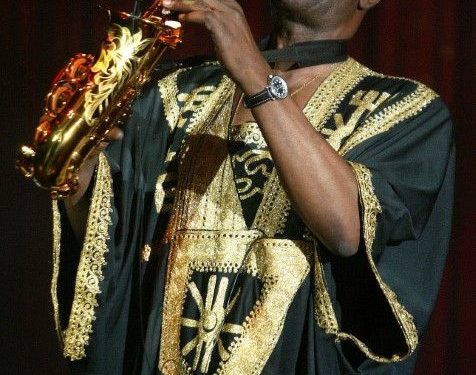Cameroon-born singer and saxophone player Manu Dibango has died from a coronavirus infection, according to a statement on his official Facebook page on Tuesday, March 24 2020.
“It is with deep sadness that we announce the loss of Manu Dibango, our Papy Groove, who passed away on 24th of March 2020, at 86 years old, further to covid 19,” it said.
Manu Dibango died in Paris France where he was in isolation for a while now.
Dibango was born in Douala, Cameroon. His father, Michel Manfred N’Djoké Dibango, was a civil servant. Son of a farmer, he met his wife travelling by pirogue to her residence, Douala. A literate woman, she was a fashion designer, running her own small business. Both her ethnic group, the Douala and his, the Yabassi viewed this union of different ethnic groups with some disdain. Emmanuel had no siblings, although he had a stepbrother from his father’s previous marriage who was four years older than he was. In Cameroon, one’s ethnicity is dictated by one’s father, though Dibango wrote in his autobiography, Three Kilos of Coffee, that he has “never been able to identify completely with either of [his] parents.”
Dibango’s uncle was the leader of his extended family. Upon his death, Dibango’s father refused to take over, as he never fully initiated his son into the Yabassi’s customs. Throughout his childhood, Dibango slowly forgot the Yabassi Language in favour of the Douala. However,
In 1941, after being educated at his village school, Dibango was accepted into a colonial school, near his home, where he learned French. He admired the teacher, whom he described as “an extraordinary draftsman and painter.” In 1944, French president Charles de Gaulle chose this school to perform the welcoming ceremonies upon his arrival in Cameroon.
Career
He was a member of the seminal Congolese rumba group, African Jazz and has collaborated with many other musicians, including Fania Al Stars, Fela Kuti, Herbie Hancock, Bill Laswell, Bernie Worrell, Ladysmith Black Mambazo, King Sunny Ade, Don Cherry and Sly and Robbie. He achieved a considerable following in the UK with a disco hit called “Big Blow”, originally released in 1976 and re-mixed as a 12″ single in 1978 on Island Records. In 1998, he recorded the album CubAfrica with Cuban artist Eliades Ochoa. GRAMMY nominated artist.
The song “Soul Makossa” on the record of the same name contains the lyrics “makossa”, which means “(I) dance” in his native tongue, the Cameroonian language Duala. It has influenced popular music hits, includingKool and the Gang’s “Jungle Boogie”. The 1982 parody song “Boogie in your butt” by comedian Eddie Murphy interpolates Soul Makossa’s bassline and horn charts while “Butt Naked Booty Bless” by 1990s hip-hop group Poor Righteous Teachers heavily samples its musical bridge and drum patterns.
He served as the first chairman of the Cameroon Music Corporation, with a high profile in disputes about artists’ royalties. Dibango was appointed a UNESCO Artist for Peace in 2004.
His song, “Raggae Makossa”, is featured on the soundtrack to the 2006 video game Scareface: The World is Yours. In August 2009, he played the closing concert at the revived Brecon Jazz Festival. In July 2014, he made an 80th anniversary concert at Olympia, France which was broadcast by TV5Monde.
In 2009 he filed a lawsuit claiming that “Don’t Stop the Music” and “Wanna Be Startin’ Somethin'” used the “Mama-say, mama-sa, ma-ma-ko-ssa” hook without his permission. According to Dibango, the line is from his 1972 single “Soul Makossa”. Agence France Presse reported that Jackson admitted that he borrowed the line for “Wanna Be Startin’ Somethin'” and settled out of court. When Rihanna asked Jackson in 2007 for permission to sample the line, he allegedly approved the request without contacting Dibango beforehand. Dibango’s attorneys brought the case before a court in Paris, demanding 500,000 Euros in damages and asking for and Warner music, Sony BMG, EMI to be “barred from receiving ‘mama-say mama-sa’-related income until the matter is resolved”. The judge ruled that Dibango’s claim was inadmissible: a year earlier, a different Paris-area judge had required Universal Music to include Dibango’s name in the liner notes of future French releases of “Don’t Stop the Music”, and, at the time of this earlier court appearance, Dibango had withdrawn legal action, thereby waiving his right to seek further damages.
On 8 September 2015, Michaelle Jean, Secretary General of the Francophonie organisation, honoured Manu Dibango with the title of Grand Témoin de la Francophonie aux Jeux Olympiques et Paralympiques de Rio 2016 (Special Representative of Francophonia to the Rio 2016 Olympic and Paralympic Games).
Dibango died on 24 March 2020 of Corona Virus.
By Louvier Kindo in Cameroon









Those who are still doubting the veracity of information about Corona Virus in Cameroon